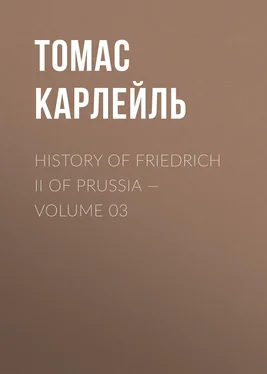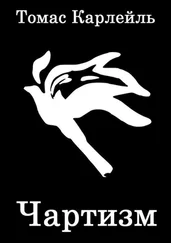Томас Карлейль - History of Friedrich II of Prussia — Volume 03
Здесь есть возможность читать онлайн «Томас Карлейль - History of Friedrich II of Prussia — Volume 03» — ознакомительный отрывок электронной книги совершенно бесплатно, а после прочтения отрывка купить полную версию. В некоторых случаях можно слушать аудио, скачать через торрент в формате fb2 и присутствует краткое содержание. Жанр: foreign_prose, История, literature_19, foreign_edu, foreign_antique, на английском языке. Описание произведения, (предисловие) а так же отзывы посетителей доступны на портале библиотеки ЛибКат.
- Название:History of Friedrich II of Prussia — Volume 03
- Автор:
- Жанр:
- Год:неизвестен
- ISBN:нет данных
- Рейтинг книги:5 / 5. Голосов: 1
-
Избранное:Добавить в избранное
- Отзывы:
-
Ваша оценка:
- 100
- 1
- 2
- 3
- 4
- 5
History of Friedrich II of Prussia — Volume 03: краткое содержание, описание и аннотация
Предлагаем к чтению аннотацию, описание, краткое содержание или предисловие (зависит от того, что написал сам автор книги «History of Friedrich II of Prussia — Volume 03»). Если вы не нашли необходимую информацию о книге — напишите в комментариях, мы постараемся отыскать её.
History of Friedrich II of Prussia — Volume 03 — читать онлайн ознакомительный отрывок
Ниже представлен текст книги, разбитый по страницам. Система сохранения места последней прочитанной страницы, позволяет с удобством читать онлайн бесплатно книгу «History of Friedrich II of Prussia — Volume 03», без необходимости каждый раз заново искать на чём Вы остановились. Поставьте закладку, и сможете в любой момент перейти на страницу, на которой закончили чтение.
Интервал:
Закладка:
As to the Burggrafship, it was now done, all but the Title. The First Friedrich, once he was got to be Elector, wisely parted with it. The First Friedrich found his Electorship had dreadfully real duties for him, and that this of the Burggrafship had fallen mostly obsolete; so he sold it to the Nurnbergers for a round sum: only the Principalities and Territories are retained in that quarter. About which too, and their feudal duties, boundaries and tolls, with a jealous litigious Nurnberg for neighbor, there at length came quarrelling enough. But Albert the third Brother, over at Anspach, took charge of all that; and nothing of it fell in Johann's way.
The good Alchemist died,—performed his last sublimation, poor man,—six or seven years before his Brother Friedrich; age then sixty-three. [14th November, 1464.] Friedrich, with his Iron Teeth and faculties, only held out till fifty-eight,—10th February, 1471. The manner of his end was peculiar. In that War with Pommern, he sat besieging a Pomeranian town, Uckermunde the name of it: when at dinner one day, a cannon-ball plunged down upon the table, [Michaelis, i. 303.] with such a crash as we can fancy;—which greatly confused the nerves of Friedrich; much injured his hearing, and even his memory thenceforth. In a few months afterwards he resigned, in favor of his Successor; retired to Plassenburg, and there died in about a year more.
Chapter IV. — KURFURST ALBERT ACHILLES, AND HIS SUCCESSOR
Neither Friedrich nor Johann left other than daughters: so that the united Heritage, Brandenburg and Culmbach both, came now to the third Brother, Albert; who has been in Culmbath these many years already. A tall, fiery, tough old gentleman, of formidable talent for fighting, who was called the "ACHILLES OF GERMANY" in his day; being then a very blazing far-seen character, dim as he has now grown. [Born 1414; Kurfurst, 1471-1486.] This Albert Achilles was the Third Elector; Ancestor he of all the Brandenburg and Culmbach Hohenzollern Princes that have since figured in the world. After him there is no break or shift in the succession, down to the little Friedrich now born;—Friedrich the old Grandfather, First KING, was the Twelfth KURFURST.
We have to say, they followed generally in their Ancestors' steps, and had success of the like kind, more or less; Hohenzollerns all of them, by character and behavior as well as by descent. No lack of quiet energy, of thrift, sound sense. There was likewise solid fair-play in general, no founding of yourself on ground that will not carry;—and there was instant, gentle but inexorable, crushing of mutiny, if it showed itself; which, after the Second Elector, or at most the Third, it had altogether ceased to do. Young Friedrich II., upon whom those Berlin Burghers had tried to close their gates, till he should sign some "Capitulation" to their mind, got from them, and not quite in ill-humor, that name IRONTEETH:—"Not the least a Nose-of-wax, this one! No use trying here, then!"—which, with the humor attached to it, is itself symbolical of Friedrich and these Hohenzollern Sovereigns. Albert, his Brother, had plenty of fighting in his time: but it was in the Nurnberg and other distant regions; no fighting, or hardly any, needed in Brandenburg henceforth.
With Nurnberg, and the Ex-Burggrafship there, now when a new generation began to tug at the loose clauses of that Bargain with Friedrich I., and all Free-Towns were going high upon their privileges, Albert had at one time much trouble, and at length actual furious War;—other Free-Towns countenancing and assisting Nurnberg in the affair; numerous petty Princes, feudal Lords of the vicinity, doing the like by Albert. Twenty years ago, all this; and it did not last, so furious was it. "Eight victories," they count on Albert's part,—furious successful skirmishes, call them;—in one of which, I remember, Albert plunged in alone, his Ritters being rather shy; and laid about him hugely, hanging by a standard he had taken, till his life was nearly beaten out. [1449 (Rentsch, p. 399).] Eight victories; and also one defeat, wherein Albert got captured, and had to ransom himself. The captor was one Kunz of Kauffungen, the Nurnberg hired General at the time: a man known to some readers for his Stealing of the Saxon Princes (PRINZENRAUB, they call it); a feat which cost Kunz his head. [Carlyle's Miscellanies (London, 1869), vi. ? PRINZENRAUB.] Albert, however, prevailed in the end, as he was apt to do; and got his Nurnbergers fixed to clauses satisfactory to him.
In his early days he had fought against Poles, Bohemians and others, as Imperial general. He was much concerned, all along, in those abstruse armed-litigations of the Austrian House with its dependencies; and diligently helped the Kaiser,—Friedrich III., rather a weakish, but an eager and greedy Kaiser,—through most of them. That inextricable Hungarian-Bohemian-Polish DONNYBROOK (so we may call it) which Austria had on hand, one of Sigismund's bequests to Austria; distressingly tumultuous Donnybrook, which goes from 1440 to 1471, fighting in a fierce confused manner;—the Anti-Turk Hunniades, the Anti-Austrian Corvinus, the royal Majesties George Podiebrad, Ladislaus POSTHUMUS, Ludwig OHNE HAUT (Ludwig NO-SKIN), and other Ludwigs, Ladislauses and Vladislauses, striking and getting struck at such a rate:—Albert was generally what we may call chief-constable in all that; giving a knock here and then one there, in the Kaiser's name. [Hormayr, ii. 138, 140 (? HUNYADY CORVIN); Rentsch, pp. 389-422; Michaelis, i. 304-313.] Almost from boyhood, he had learned soldiering, which he had never afterwards leisure to forget. Great store of fighting he had,—say half a century of it, off and on, during the seventy and odd years he lasted in this world. With the Donnybrook we spoke of; with the Nurnbergers; with the Dukes of Bavaria (endless bickerings with these Dukes, Ludwig BEARDY, Ludwig SUPERBUS, Ludwig GIBBOSUS or Hunchback, against them and about them, on his own and the Kaiser's score); also with the French, already clutching at Lorraine; also with Charles the Rash of Burgundy;—lastly with the Bishop of Bamberg, who got him excommunicated and would not bury the dead.
Kurfurst Albert's Letter on this last emergency, to his Viceregent in Culmbach, is a famed Piece still extant (date 1481); [Rentsch, p. 409.] and his plan in such emergency, is a simple and likely one: "Carry the dead bodies to the Parson's house; let him see whether he will not bury them by and by!—One must fence off the Devil by the Holy Cross," says Albert,—appeal to Heaven with what honest mother-wit Heaven has vouchsafed one, means Albert. "These fellows" (the Priests), continues he, "would fain have the temporal sword as well as the spiritual. Had God wished there should be only one sword, he could have contrived that as well as the two. He surely did not want for intellect (Er war gar ein weiser Mann)," —want of intellect it clearly was not!—In short, they had to bury the dead, and do reason; and Albert hustled himself well clear of this broil, as he had done of many.
Battle enough, poor man, with steel and other weapons:—and we see he did it with sharp insight, good forecast; now and then in a wildly leonine or AQUILINE manner. A tall hook-nosed man, of lean, sharp, rather taciturn aspect; nose and look are very aquiline; and there is a cloudy sorrow in those old eyes, which seems capable of sudden effulgence to a dangerous extent. He was a considerable, diplomatist too: very great with the Kaiser, Old Friedrich III. (Max's father, Charles V.'s Great-Grandfather); [How admirable Albert is, not to say "almost divine," to the Kaiser's then Secretary, oily-mouthed AEneas Sylvius, afterwards Pope, Rentsch can testify (pp. 401, 586); quoting AEneas's eulogies and gossipries ( Historia Rerum Frederici Imperatoris, I conclude, though no book is named). Oily diligent AEneas, in his own young years and in Albert's prime, had of course seen much of this "miracle" of Arms and Art,—"miracle" and "almost divine," so to speak.] and managed many things for him. Managed to get the thrice-lovely Heiress of the Netherlands and Burgundy, Daughter of that Charles the Rash, with her Seventeen Provinces, for Max, (1477) who was thought thereupon by everybody to be the luckiest man alive; though the issue contradicted it before long.
Читать дальшеИнтервал:
Закладка:
Похожие книги на «History of Friedrich II of Prussia — Volume 03»
Представляем Вашему вниманию похожие книги на «History of Friedrich II of Prussia — Volume 03» списком для выбора. Мы отобрали схожую по названию и смыслу литературу в надежде предоставить читателям больше вариантов отыскать новые, интересные, ещё непрочитанные произведения.
Обсуждение, отзывы о книге «History of Friedrich II of Prussia — Volume 03» и просто собственные мнения читателей. Оставьте ваши комментарии, напишите, что Вы думаете о произведении, его смысле или главных героях. Укажите что конкретно понравилось, а что нет, и почему Вы так считаете.









